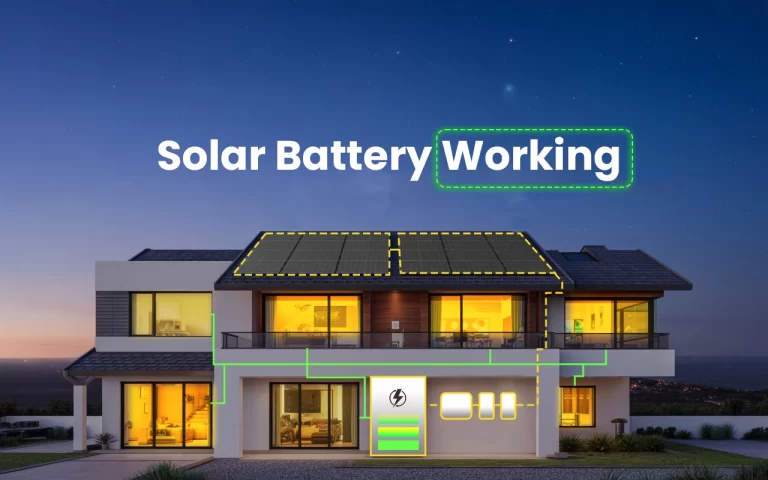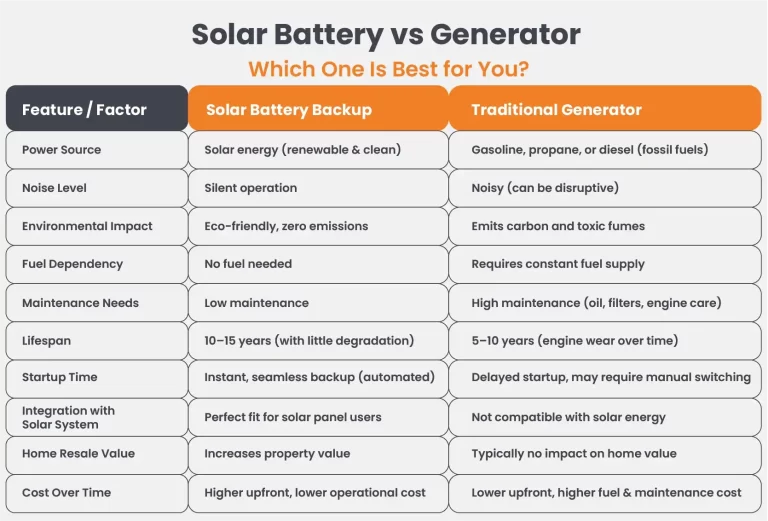- Updated On: August 07, 2025
Solar Battery vs. Generator: Should I Get a Generator or Battery Backup?
In the U.S., prolonged power outages are increasingly common, leaving homes and businesses without power and leading to a reduction in work efficiency. From severe weather to grid failures, intermittent power outages are becoming a growing challenge, posing a real threat to day-to-day life and productivity. Due to this growing issue, people now look for alternative power sources. But the common dilemma is solar battery vs generator: which one is best for you? While generators have been the standby power source of choice for years, solar batteries are increasingly in demand for their quiet, clean, and renewable options.

Whole-house generators are diesel or gas-powered but come with noise pollution and maintenance costs. On the other side, a solar battery is a clean and smart alternative to traditional generators. They can work standalone as well as with solar panels for powering your place during power outages without any interruptions. Also, they are not noisy and automatically turn on. Moreover, you can store excess solar power during the day using the solar batteries and send it back to the grid or use at night. In case of cloudy days, you can use grid power with the credits you earn with net metering.
We will explore the pros and cons of both options and analyze solar batteries and traditional generators on the basis of some major factors to determine which one is a better backup solution.
How does solar battery storage work?
You can store the excess power your solar panels produce if you have battery backup solutions. You can utilize this saved electricity to power your house at night and when the panel isn’t working as well.
During an outage, you can use the energy stored by home battery backup systems, such as the Tesla Powerwall 3 or the LG Prime, to power your home. Solar batteries are powered by the excess power that your solar panels generate during the day. They are, therefore, far more environmentally friendly than standby generators that run on fuel. They may also be more cost-effective.

In addition, you can use a battery backup system to reduce your electricity costs if you have a time-of-use utility plan. You can utilize your battery backup to power your house during peak hours rather than paying high electricity bills. You can recharge your battery during off-peak hours and use your electricity as usual during on-peak hours. Moreover, you can earn credits with net energy metering and solar buyback plans and even sell SRECs in return for cash in some states.
How does a traditional backup generator work during a power outage?
There are two common types, including standby backup generators and portable generators. Portable generators are compact, movable, and ideal for temporary power needs. However, standby generators are permanently installed systems that automatically power your home during outages. Also, if you want to turn a generator on automatically, sensors are required to be installed for detecting grid failure. Furthermore, a generator requires fuel like natural gas, liquid propane or diesel for working, depending on the type of system. They can operate around 10,000 to 30,000 hours during their lifespan.

Solar Battery vs. Generator: Comparing Cost, Benefits & Savings
Solar batteries and generators are both used as backup power sources. However, let’s evaluate both options to help you decide which is better according to your requirements.

Cost:
Installing a battery backup may be a little more expensive initially; however, generators run on gasoline, and having a steady supply of fuel can end up costing you even more in the long run. The cost of a solar battery also varies, depending on your electricity requirements, battery brand, model of solar battery, etc. However, if you compare the benefits of adding a battery backup with the one-time investment, it definitely worth it. On the other hand, although the upfront cost of installing a generator is less than solar batteries, they require fuel to operate which is an ongoing expense. Also, they require routine maintenance and inspection while battery storage does not require any additional costs.
Power Capacity:
With a standby/portable generator, you can power up your place for as long as you have enough fuel to operate it. On average, a backup generator can work up to 3 weeks continuously with enough fuel. But solar batteries have limited power storage capacity as compared to generators. However, as per your energy requirements, you can increase the number of batteries. Also, you can invest in best battery solutions like Tesla Powerwall for more power capacity. Moreover, if you pair your solar panels with a battery storage, you can maximize your dependence on the grid.
Installation:
Installing a traditional generator requires more labor than battery backups. You can mount them anywhere on the walls or can place them on the floor. On the other hand, generators are typically noisy and can only be placed outside or in the backyard. In addition to a transfer switch, you may require to build a slab of concrete to connect the generator with the fuel source.
Expected Lifespan and Warranty:
Among solar batteries vs generators, backup storage comes with longer warranties, commonly 10-15 years. However, it may vary with the solar battery brand. Also, batteries include an end-of-warranty capacity rating, which indicates how well they will maintain a charge by the end of their warranty period. Like, after a 10-year lifespan of Powerwall, Tesla promises that the battery will still have 70% of its capacity. On the other hand, the lifespan of standby generators may be estimated more easily. As long as they are properly maintained, high-quality options like Generac generators can operate for 3,000 hours.
Maintenance:
Among other benefits of installing a battery storage system over a generator, maintenance is also a major factor. Once installed, they work quietly and independently with your energy system and do not emit any harmful materials. Also, they do not require any ongoing maintenance during their lifespan. However, generators can be very noisy and annoying while operating. Also, they are not an environment friendly backup option as they release harmful fumes that pollute the air.
Solar Battery or Traditional Generator: Which backup option is better?
As the electric costs are rising and power outages are becoming more frequent, investing in a solar system with a battery storage system is a smart decision for homes and businesses. You will not only maximize your grid independence but also earn from your excess power generation. If you are concerned about the upfront cost, a 30% federal tax credit and other state incentives are available in 2025 to cut the initial expenses. Furthermore, if you do not have enough cash, there are flexible financing options like solar loans also available to make your switch affordable. Traditional generators, although a cheaper option, require fuel to operate, which is an ongoing additional cost for you. Also, they are noisy and not an environmentally friendly backup solution.
If you are looking for affordable solar and backup options, Solar SME is a Tesla-certified solar installation company in your area. You can get a FREE Quote with our smart solar calculator for estimation.
Remember! The 30% tax credit is expiring on December 31, 2025. So, plan your installation early for massive savings.
Related Articles:
The demand for battery backup solutions is surging in the U.S. as people are now finding ways to reduce their reliance on grids.
2025 is a game changer for solar energy as the U.S. accelerates its transition toward a sustainable future. Because of skyrocketing energy bills, persistent inflation, and increasingly frequent long power outages.
With frequent long power outages in the United States due to bad weather conditions and grid failures, homeowners are now seeking solutions to protect themselves and reduce their reliance on the power grid.



